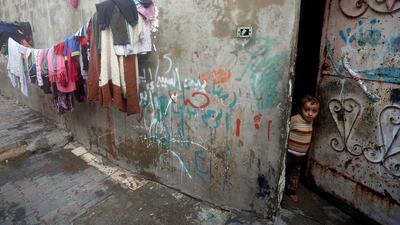Global forced displacement is a critical challenge of our era. At a time when war, violence and persecution has compelled a record 65 million people to flee their homes, other emerging drivers of displacement, including environmental degradation, food insecurity and climate change threaten to overwhelm already stretched humanitarian response mechanisms.
A total of 86 per cent of refugees are sheltered in low and middle-income countries, nations often struggling with their own development challenges and least equipped to support new arrivals with infrastructure, services and livelihood opportunities. And, despite record acts of giving, UN agencies and partners are faced with large financial deficits, forcing them to cut life-saving programmes and reduce access to essential services, adding further pressure on host countries, putting local economies at risk and threatening social cohesion within host communities. The world urgently needs new ideas and innovative solutions to ease the humanitarian crisis, better support host nations and find creative, cost-effective and sustainable ways to increase self-reliance for both refugees and host communities.
In September 2016, the UN General Assembly laid out a vision for a more comprehensive and sustainable response to forced displacement. It envisioned a world where refugees have access to countries in which they are safe, where they are better included within local societies and where they are no longer solely dependent on humanitarian aid. It recognised that when refugees are given opportunities to become active participants in local communities, they become self-reliant, contribute to local economies and fuel the development of communities hosting them. Refugees and host communities can mutually empower each other, socially and economically.
Over the last months, the UN Refugee Agency (UNHCR) and its partners have been working with a diverse range of partners, including governments, the private sector, international financial institutions and civil society, launching initiatives to lessen long-term dependence on humanitarian aid and to better equip refugees and host communities to thrive and flourish.
There is an increasing body of evidence proving that engaging refugees makes good business sense and that vibrant refugee economies create opportunities and bring in skills, capital and connectivity to global economies. In Cleveland, Ohio, a recent study found that $4.8 million invested in resettling refugees in 2012 returned about $48 million in economic impact within a few years. In Uganda, another study found that refugee economies have become nested within local Ugandan economies, attracting goods, people and capital from outside and increasing productivity and economic benefits inside. And in Kenya, the World Bank reported that the protracted refugee presence in the Turkana region had boosted the local economy by more than three per cent.
Technology-driven approaches – including mobile connectivity, open data platforms and connected learning – offer an entry point for the private sector. Improving access to sustainable energy offers another. Renewables can provide affordable, safe and sustainable energy solutions, spur sustainable economic growth and create jobs within both refugee and host communities.
There are obvious economic benefits. In 2015, Chatham House in London noted that household energy use among displaced communities amounted to the equivalent of about 3.5 million tonnes of oil, predominantly in the form of firewood and charcoal, at an estimated cost of $2.1 billion per year. However, the widespread introduction of clean cook stoves and solar lanterns could save $323 million per year in fuel costs in return for a one-time capital investment of $335 million and carbon emissions savings of about 6.85 million tonnes per year.
Last year Jordan switched on solar photovoltaic plants at its two largest refugee camps, Zaatari and Azraq, transforming the lives of more than 100,000 Syrian refugees. Families now power their shelters, run essential electrical appliances, recharge their phones, study and work after dark and walk safely at night. The 12.9-megawatt (MW) solar plant in Zaatari and 5MW plant in Azraq will save UNHCR $12.5 million per year in electricity costs and reduce carbon emissions by more than 20,000 tonnes a year. In Azraq, so far more than 50 refugees have benefited from training and employment by the Jordanian solar company Mustakbal. And with both plants connected to the Jordanian national electricity grids, unused electricity generated can be fed back into the network at no cost, helping support the energy needs of host communities.
Furthermore, sustainable energy solutions are increasingly mobile. Small, versatile and hybrid technologies, flyaway power and life support systems, matched to associated water, waste water, lighting, refrigeration and air conditioning systems, can be optimised and deployed for humanitarian operations globally, significantly reducing current inefficient and costly diesel solutions. Mini grid systems, solar-powered lanterns, street lights, boreholes and water pumps power refugee settlements and provide clean drinking water, sanitation and hygiene projects to small communities in austere and off-grid locales. And fuel-efficient cook stoves and sustainable biomass products are addressing the harmful impact of cooking fuels and inefficient open fires on the health and wellbeing of refugees, as well as on the environment. In Rwanda, a social enterprise, Inyenyeri, has developed locally-made fuel pellets which have dramatically reduced the amount of biomass required for cooking and exposure to toxic emissions.
The UN's Sustainable Development Goals, including SDG 7 – "ensuring universal access to affordable, reliable and modern energy services by 2030" – require the inclusion of refugees. Sustainable energy is already helping improve the lives of some of the world's most vulnerable inhabitants. It has enormous potential to upscale and provide efficient and safe methods of cooking, lighting, and heating, ensure the provision of clean water, improve human health, better protect women and children, and underpin access to education and livelihood activities for millions of people. It can make refugee settlements cheaper and more sustainable, stimulate growth in energy-poor host communities and help nurture and restore the planet's most fragile environments. At a time when the world needs creative planning, broader partnerships and innovative solutions to ease its most pressing crises, sustainable energy offers us a way forward.
Toby Harward is head of office at UNHCR in the UAE

